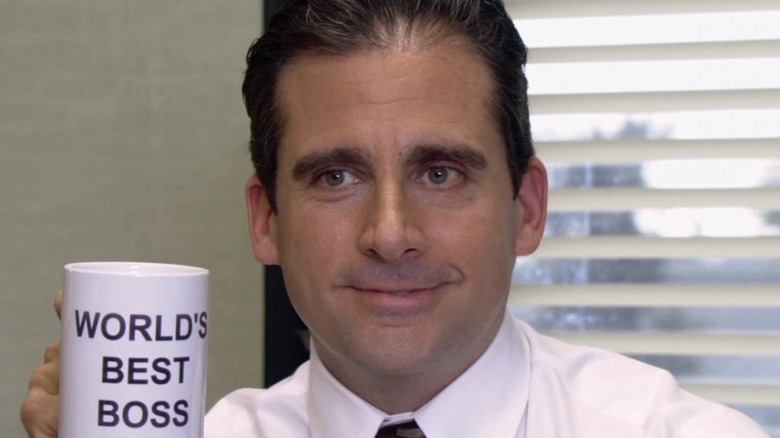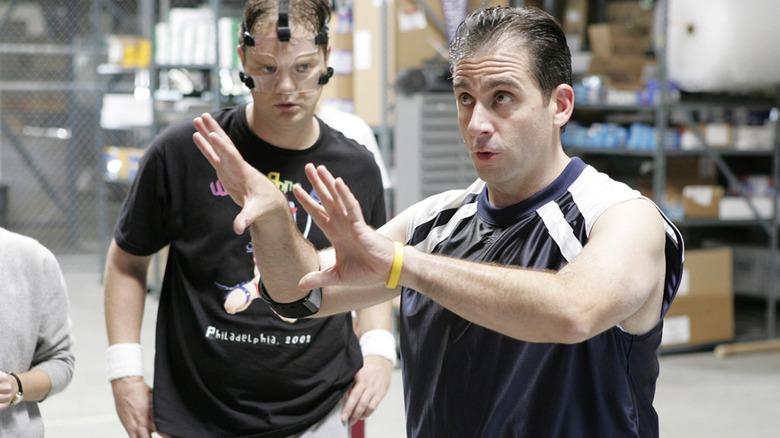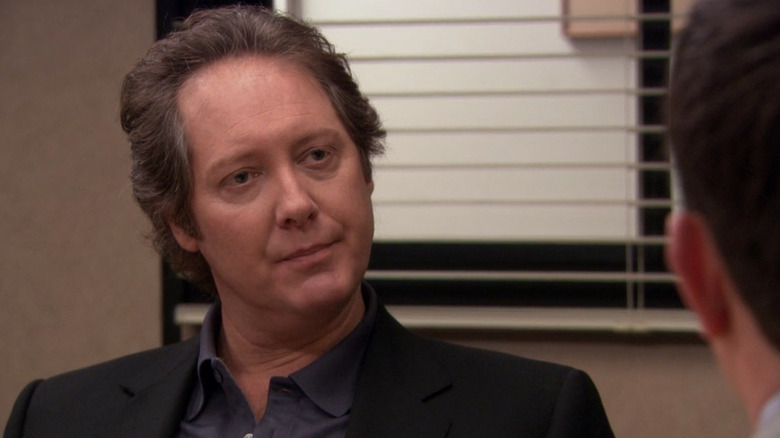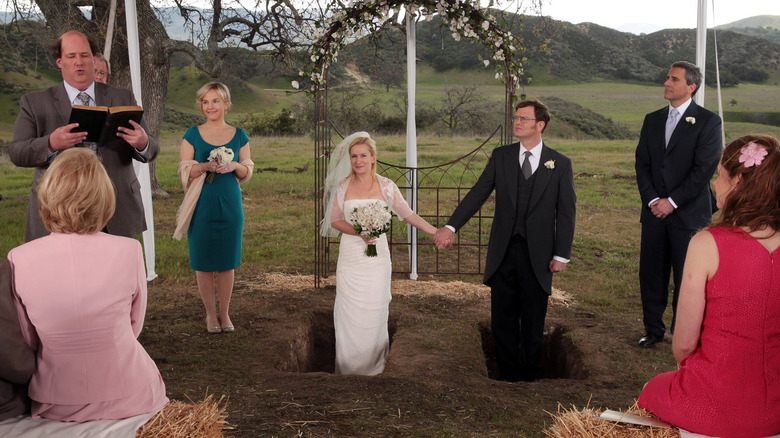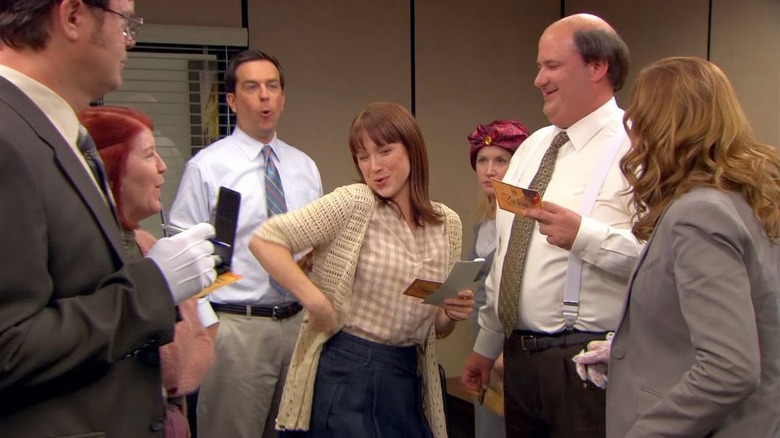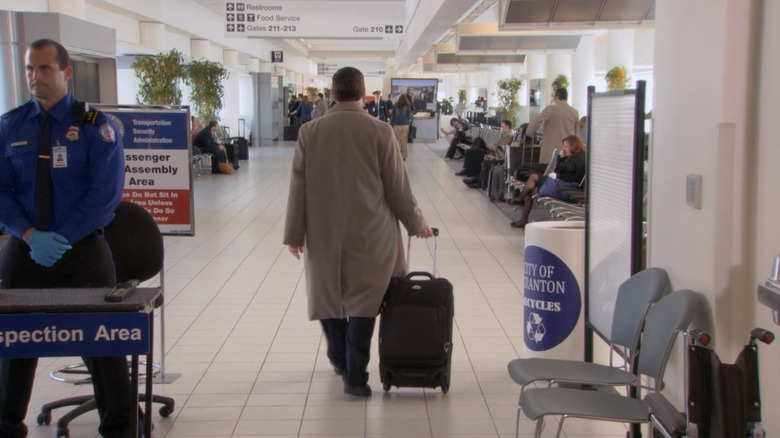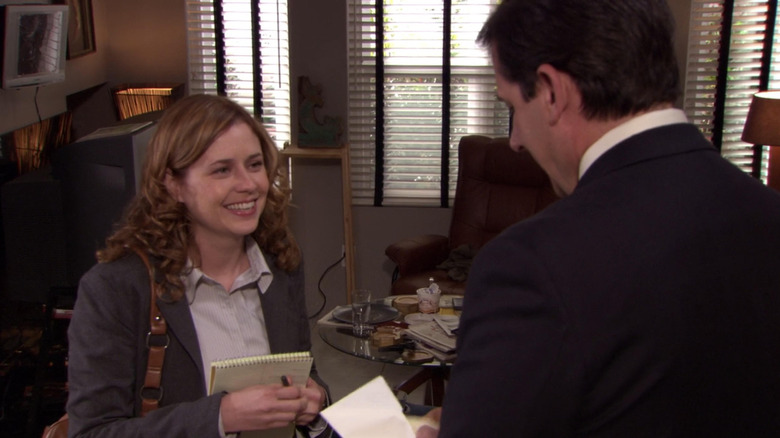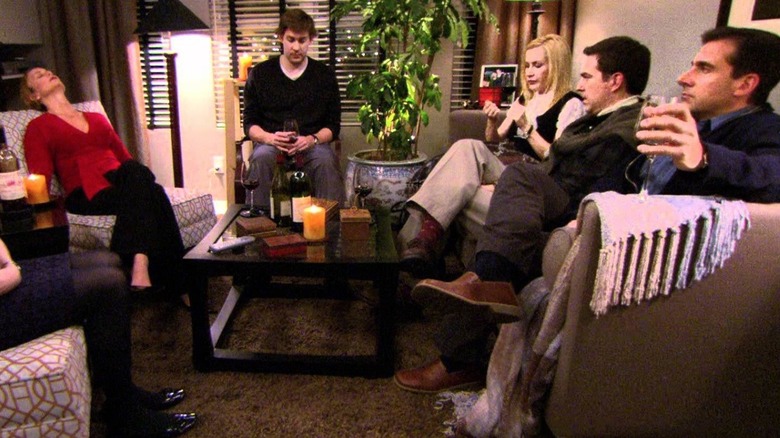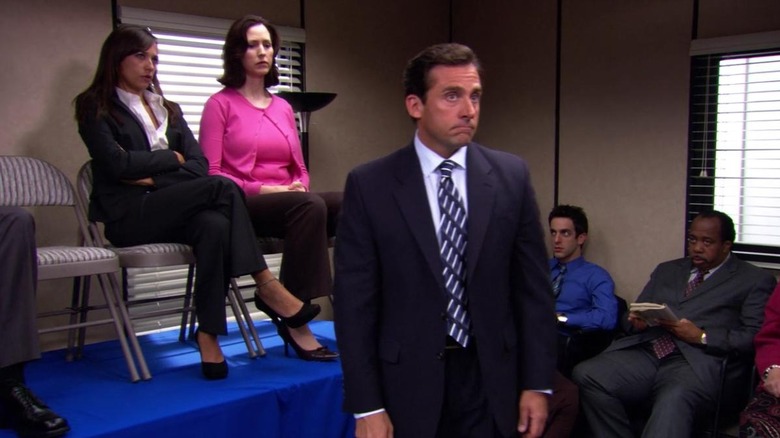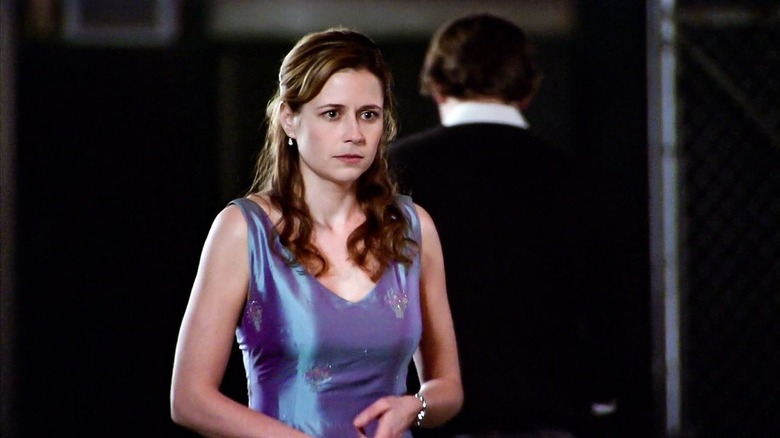The Office: Every Season Ranked Worst To Best
One of my favorite moments from NBC's "The Office" doesn't make many sites' best scene lists, nor is it beloved by fans (or even its cast and crew, to be honest). But I'll just say it: The scene from "Dunder Mifflin Infinity" in which Michael and Dwight retrieve their old-school gift basket from an indifferent client is "The Office" at its best. The scene is funny. The scene is sad. Most importantly, the scene features characters who are striving for greatness as they nosedive towards failure, grasping for glory mid-plummet. No one on "The Office" gives up (even when they should). To paraphrase Bruce Banner, that's their secret, Cap: They're always trying.
NBC's "The Office" also could have rested on its laurels. By 2007, it was one of the world's biggest sitcoms, both critically celebrated and a massive commercial hit. But even when the show stumbled, it never stopped gunning for a certain standard of greatness. That it did so as real life threw not one but dozens of obstacles in its way grows more remarkable by the year. The Office" is not just a triumph of American comedy — it's a testament to the dedication of a creative team that oversaw multiple soft relaunches, a strike-shortened season, and its lead performer's departure. Here are all of its seasons, ranked from worst to best.
9. Season 1
"The Office" becomes "The Office" as we know it three episodes into Season 2, when Michael Scott, regional manager, returns from an emotionally taxing condo purchase to join the closing ceremonies of an office olympics. He is awarded a gold medal made of yogurt lids by Jim Halpert. As the "Star Spangled Banner" plays, he cries. It is the first moment when we see Michael Scott the man, not Michael the monster boss; it's a gorgeous shot and the show all but makes it a North Star for five subsequent seasons.
What that implies, though, is that "The Office: that precedes it — the oft maligned Season 1 — isn't really the show we know and love. At best, it's an inefficient port of Ricky Gervais and Stephen Merchant's bleak and deeply British original; at worst, it was a show that understood it was misfiring and did so anyway. "There was a moment when we were shooting the last episode ... and everyone was a little bit glum," producer Mike Schur recalls in an incredible interview with Vox. "Even though the show wouldn't air for months, everyone kind of felt like, there's no way this ever works."
They were right. The show had to pivot. And while "The Office" eventually found success through a series of surprising and creative left-turns, one season near the end of its run proved almost as uninspired...
8. Season 8
The only man to fill Michael Scott's shoes as regional manager was not Dwight Schrute; it was always and forever Cornell's Andrew Bernard. That's not just because Ed Helms is a comic supernova. It's because Andy, like Michael, becomes a better man through Dunder Mifflin; because Andy, too, is a mess of toxic entitlement who grows through finding structure, love, and meaning at a mid-tier paper company. There are more Andy Bernards in the world than there are Jerry Seinfelds or Liz Lemons or Michael Bluths. Andy Bernards deserve their shot, even when taking said shot means staying mad at Staples. Andy was always the next Michael — even his fall from grace in Season 9 is Michael-esque.
Is it any wonder, though, that the show chose Robert California and Nelly Bertram first? Great shows rarely want to run it back — they choose expansion, change, and growth. And in making the Lizard King and a former Formula One race car driver regional manager before Andy Bernard, "The Office" offered us a slightly different spin on Dunder Mifflin's business as usual. The problem? It didn't work.
And so, while "The Office" does the yeoman's work of chronicling Andy's journey to become branch manager, what should feel fresh quickly becomes wheel-spinning. Despite a handful of very good episodes ("Trivia" and "Get the Girl" chief among them), Season 8 is one of the lesser offerings of "The Office."
7. Season 9
While few would argue that Season 9 of "The Office" is the show's finest hour, it serves as a low-key and frequently lovely meditation on the passage of time. When it's not introducing new characters, it's musing on whether those characters are merely echoes of ones who came before; when it's practically wringing Andy through the Book of Job, it's wondering what he's outgrown, for better and for worse.
We see the seams of "The Office" in its final set of episodes; this is by design. The documentary crew is revealed. Jim and Pam's marriage becomes frayed. Characters return to "The Office" through somewhat forced contrivances, and the whole show seems to be slowly running out of steam.
And yet, a show that could've taken any number of easy ways out chooses to make its greatest comic foil less of a caricature, and to normalize the notion that good partnerships sometimes need professional psychiatric counseling. As Michael Scott once said, "A good manager doesn't fire people. He hires people and inspires people ... And people will never go out of business." As "The Office" closes up shop, it doubles down on the people who populated it. That's good business — and even better art.
6. Season 6
Season 6 of "The Office" should work better because the Sabre Company, like a "that's what she said" quip, is inevitable. When Season 5 decided to divorce Michael Scott from the job that defined him, the next logical step for Michael was expanding his job beyond its point of meaningfulness. Making Kathy Bates Michael's misery was a wise move.
It's a shame, then, that Sabre is what's least effective about Season 6 of "The Office." For its first 13 episodes, both Dunder Mifflin and the primary characters that inhabit it are forced to reckon with major life changes, as well as the weight of past mistakes both institutional and personal. The comedy informing these episodes, while even broader than in seasons past, rises to meet the seismic stakes of events like weddings, birth-giving, and corporate bankruptcy. I would hold the mid-season episode "Murder" against anything else "The Office" has ever done, both as a work of character development and rapid-fire joke deployment.
What a shame, then, that unnecessary clip show episode "The Banker" forebodes a back half of plot development that largely functions as padding. Though Sabre yields a handful of characters who make an impact (primarily Zach Woods' Gabe and Will Farrell's Deangelo Vickers), it's mostly sound and fury by the show's end — unlike the episode that anchors our next entry...
5. Season 7
In the parlance of another smash NBC comedy, Season 7 is the one where Michael leaves. As such, it belongs in the pantheon of great American comedy. In an alternate universe, "Goodbye Michael" is the series finale of "The Office": it is artful, it's hysterical, and it has three all-time great "Office" character beats. I'm also glad it isn't. The US "Office" was, from its inception, anchored by an increasingly legendary performance. But it was never "The Michael Scott Show." Through "Goodbye Michael," writer Greg Daniels and director Paul Feig hone in on an important truth: Be it in an office or on a television show, the loss of a constant reshapes a place's gravity. There is no replacing a Steve Carell; you can only let the universe rework itself out.
Before that graceful embrace of chaos, Season 7 of "The Office" is as uneven as any of the show's latter seasons, but more than Season 8 or Season 9, it has appreciated in value due in no small part to Twitter. Rarely does a day go by when you don't see a GIF from "Threat Level Midnight" or "Classy Christmas." For my money, "Viewing Party," "Counseling," and "Andy's Play" are impeccable examples of how a show can expand its characters and what they're capable of almost a decade into its existence.
4. Season 5
What is the Michael Scott Paper Company? On its surface, it's an aging manager and some employees embracing their roles as the little guy, trying to make waves in a slowly dying industry. A deeper read might argue that it's "The Office" re-embracing itself. Much was made of the show's shoestring budget expanding when it became a mega-hit, and its sense of humor broadened right along with it; there are those who think it lost a step along the way. I'm not here to argue whether it did or didn't.
What feels almost unarguable is that the Michael Scott Paper Company arc (which begins with "Prince Family Paper" and runs straight through "Broke") ranks among the show's finest storylines. It's a reclamation of the show's underdog spirit that's also, on occasion, side-splittingly funny (plus, it gives us a subdued and villainous Idris Elba).
A handful of other factors elevate Season 5: a series of excellent standalone episodes ("Moroccan Christmas," "The Duel," and "Golden Ticket"); the gorgeous, slow-roll development of Michael and Holly, a pairing that irrevocably shifts the show's universe; and a renewed focus on the Dunder Mifflin office itself, and the mundane responsibilities that brought these misfit characters together and reveal them as quietly extraordinary. The more you think about it, Season 5 is the Michael Scott Paper Company. No wonder it's so good.
3. Season 4
In a podcast for the Ringer, noted "The Office" superfan Shea Serrano makes the compelling argument that "Dinner Party" isn't the show's best episode, because the pinnacle of a show set at work should probably be one that takes place at work. Fair enough! But whether you agree with this assessment or not, it's hard to see "Dinner Party" as anything other than one of the very best episodes of television ever created. "Dinner Party" is "Who's Afraid of Virginia Woolf," but funnier. It's cringe-worthy, yet endlessly watchable. And it offers, as co-creator Greg Daniels described in Rolling Stone's essential oral history of the episode, a chance to see "the killing fields" in action:
"I had an expression that I used in the writers' room to describe a scene where the situation was charged, where several characters had different opinions and there was an excuse for them to all sit around and fire off great lines one at a time. I called it a 'killing field,'" Daniels explains. "Once Jim and Pam got to the condo, this entire episode was a killing field."
That said, a great album isn't defined by one hit song, and "Dinner Party" can't a great season of TV make. "The show's 4th season is full of essential installments, from "Fun Run" to "Dunder Mifflin Infinity" to the introduction of Holly Flax in "Goodbye Toby." Season 4 of "The Office" is an extended killing field of comedy. If it lacks the impeccable season-long storytelling of its top two efforts, it still takes home the bronze.
2. Season 3
In our ever-ongoing Golden Age of Television, it's rare to see shows "blow it up." The term, which almost serves as counterpoint to "jumping the shark," refers to when a program makes a plot decision that irrecoverably alters future possibilities, usually at the expense of stories that have been brewing for seasons. When "Alias" dismantled SD-6? That was blowing it up. The Red Wedding? Blowing it up. "The Office" has lower stakes than anything George R.R. Martin or J.J. Abrams have ever made. And yet, when Jim kissed Pam at the end of Season 2's "Casino Night," it felt like a bomb had gone off. The romantic tension was supposed to sustain Greg Daniels' reboot for multiple seasons. Surely, we weren't blowing it up already?
The answer was, as "The Office" brilliantly revealed, yes and no. The show's 3rd season follows the consequences of that single, game-changing kiss to their logical but surprising ends. Pam breaks off her engagement with Roy. Jim, heartbroken, transfers to Dunder Mifflin's Stamford branch. When Michelangelo carved statues out of marble, he claimed that he was unearthing works already there, and was simply finding angles from which to reveal them. Season 3 of "The Office" is a perfectly fresh — and much-needed — angle on the story of Jim and Pam.
But that's not all. Season 3 gives us the Nard Dog, Andy Bernard. It introduces Karen Filippelli. And it's almost front-to-back classic episodes, from "The Coup"'to "Benihana Christmas" to "Ben Franklin." Season 3 was "The Office" at its most consistently surprising and rewatchable. You can't really blow such a show up.
1. Season 2
When I was in college, my best friend and I used to come back from a long day of rehearsals and classes to watch "The Office" on DVD. We watched Season 2 ad nauseum; we learned every line. The show was offering so much more than schadenfreude-laden catharsis; it was yielding us a window to the future. In 2006, "The Office" felt like evolved television. For two young actors who wanted to make art, it was everything.
We weren't alone, it seems. The 2nd season of "The Office" was, in retrospect, a watershed moment both for broadcast television and American TV comedy. It had an indie sensibility that paralleled the rise of Pitchfork and independent bands (a fact backed up by the Filter Magazine cover story in which John Krasinski interviews The Shins); it was heartbreaking in a way that other half-hours hadn't been, at least not so consistently. During its 2nd season, "The Office," was both a show for the moment and a genuine trailblazer. What's even more remarkable is how well it holds up.
There is no bad episode in "The Office" Season 2. I'd argue there's not even any non-essential episodes of "The Office" Season 2. Season 2 of "The Office" is the sort of breathless, loose-yet-serialized storytelling that peak TV has had to wander back to as we return to a post-binge weekly release structure. But, these days, most prestige shows rarely air more than 13 installments at a time; "The Office" had to make 22. It's essential television that feels as breezy as a fall day in Scranton. There's nothing else like it.
